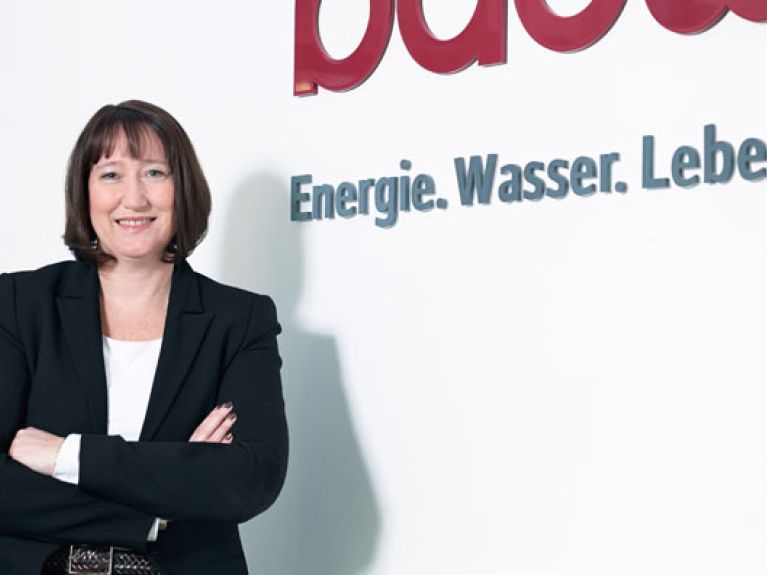“We can both benefit from sharing our know-how”
Hildegard Müller on German-Israeli approaches to their future energy supply.

Ms. Müller, what significance do people in Israel attach to Germany’s transition to renewable energies?
People in Israel are mainly curious about whether Germany is managing to combine its ambitious ecological goals with economic success. However, Israel is not the only country interested in this. So too is any country that is concerned with the future of its energy supply. Energy transition is very significant for Israel solely because self-sufficiency in the use of resources is very important for that country
Is this different to the situation in Germany?
Yes, the two countries have different motivations. While Germany wants to phase out the use of nuclear energy by 2022 and, consequently, the focus is on renewable energies as an alternative to nuclear energy, the Israeli energy industry is now focusing on using offshore gas reserves in the Mediterranean. Israel wants to use them to ensure energy independence in the medium to long term and to become involved in export. The deposits are a real godsend for Israel. Production started at the Tamar field in 2013. Experts have estimated that it has more than 240 billion cubic metres of natural gas. Leviathan, a much bigger field, will go into production from 2016. It contains more than 450 billion cubic metres of natural gas.
In Germany, more than 20% of electricity now comes from renewable energy sources such as wind and sun, but in Israel the figure is not even 2%. Does this mean that the topic of renewable energies is not very important in Israel?
This can also be explained by the two countries’ different backgrounds. On the one hand, Israel started to develop renewable energies much later. On the other hand, there is to some degree a different way of thinking when it comes to climate change and using fossil fuels. In Israel, the motivation for developing renewable energies is more the wish for energy-independence and self-sufficiency. However, there is also increasingly a serious interest on Israel’s part in promoting the topic.
What do the two countries have in common when it comes to the energy transition?
Germany and Israel are both high-tech countries that benefit from sharing information and know-how on energy, for example, in the broad field of energy efficiency, heating and refrigeration as well as smart grids. The latter involve intelligent electricity networks that optimize the networking and control of electricity producers, storage systems and consumer appliances to maintain an efficient, reliable energy supply.
Can German and Israeli companies benefit from this too?
I am convinced that they can. There is enormous potential for companies in both Israel and Germany even if they have completely different framework conditions and follow their own strategies for energy production. The development pressure around the topic of energy is so great at a global level that research-intensive industries can gain a competitive edge here. I am sure that Germany’s energy transition will also open up new areas of business for Israeli companies. When it comes to the upgrading distribution networks, for example, there will be opportunities for Israel’s IT and high-tech industry to supply the necessary know-how. At the same time, the areas of energy efficiency and natural gas system solutions present interesting business sectors for German companies in Israel. I can also imagine many activities in third countries.
How does bilateral cooperation work in practical terms?
Cooperation is already well advanced. There are various projects where foreign trade chambers have a key role in coordination. Here is one example: GIREC, the German-Israeli Renewable Energy Committee, brings together market leaders and smaller companies from both countries. There are advantages to both parties from this. Small and medium-sized companies can build contacts with major players, while large companies can benefit from the innovative technologies of the versatile and inventive business start-ups. Given the research density in Germany and Israel, there is sufficient reason to look to the future with optimism. The German-Israeli Trade Association also brings together companies at a practical level.
Are German researchers able to keep up with the highly adaptable Israeli start-ups? After all, Israel is currently considered the most significant technology incubator after California’s Silicon Valley.
Germany has nothing to be ashamed of – there is huge potential here. Science in Germany is in fact better positioned than ever. The buzzwords here are Higher Education Pact, Excellence Initiative, Pact for Research and Innovation – never before has the Federal Republic invested as much money in research as it is today. German institutions are therefore most definitely competitive in the race to attract the best brains. In conjunction with knowledge and new ideas from Israel, this can advance the energy transition in both countries and also provide solutions for energy problems in other countries. ▪
Interview: Sybille Wilhelm
Hildegard Müller
The President of the German-Israeli Trade Association has also been CEO of the German Association of Energy and Water Industries (BDEW) since October 2008 and is Chair of the German Society for Yad Vashem, the centre of Holocaust remembrance in Israel. She is a graduate in business administration and represented her hometown of Düsseldorf as a Member of the Bundestag from 2002 to 2008. From 2005 to 2008 she was Minister of State with Federal Chancellor Angela Merkel.

